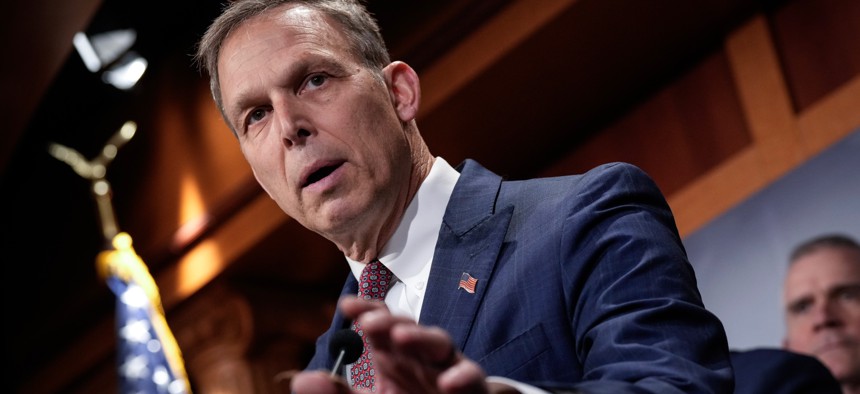
House Subcommittee on Economic Development, Public Buildings and Emergency Management Chairman Scott Perry, R-Pa., was among several members raising questions over the GSA's selection for the new FBI headquarters. Drew Angerer / Getty Images
GSA, FBI still at odds over headquarters selection, while House subcommittee smells ‘a rat’
Officials from the two agencies continued airing their dissenting positions over the Greenbelt site selection of the new FBI headquarters Tuesday, while subcommittee Chairman Scott Perry, R-Pa., found the site’s connection to WMATA incredulous.
The controversy over the proposed site of the new FBI headquarters didn’t let up Tuesday, as Bureau and General Services Administration officials continued to differ over the decision process behind the latter’s selection of a site in Greenbelt, Maryland.
The dispute played out somewhat respectfully before the House Subcommittee on Economic Development, Public Buildings and Emergency Management, whose members, in contrast, were often nonplussed over the years-long saga to name a new site and the subsequent controversy once one was picked.
“The American people smell a rat here,” said subcommittee Chairman Scott Perry, R-Pa., referring both to the decision of former Public Buildings Service Commissioner Nina Albert to overrule a site selection panel to pick Greenbelt and her past ties to the Washington Metropolitan Area Transit Authority, which owns the land at the Greenbelt site.
Not present at Tuesday’s hearing was Albert, who was invited to testify and declined. Now deputy mayor for planning and economic development in Washington, D.C., Albert was given site selection authority to pick the new home of the FBI in July 2023 following congressionally directed consultations with Virginia and Maryland delegations.
Albert’s selection — given her former role as WMATA’s vice president of real estate and parking — and GSA's adjustment of its assessment criteria to put more weight on cost, promoting sustainable siting and advancing equity were frequent targets of inquiry and criticism by the subcommittee.
Current PBS Commissioner Elliot Doomes reasserted GSA’s impartiality to the site selection and its transparency of the selection process.
“GSA ran a fair and transparent process and followed the publicly outlined plan,” he said. "The site selection’s decision, as well as the panel’s evaluation and recommendation, are all available on our website. GSA has also released correspondence between GSA and FBI, including the legal review by GSA’s general counsel in response to the FBI’s questions.”
But Nicholas Dimos, assistant director of the FBI’s Finance and Facilities Division, said that while the Bureau agrees with the need for a new headquarters and will acquiesce to Congress’ decision for a suburban location, it nevertheless takes issue with Albert’s pick of the Greenbelt site.
“In the final weeks of the process, the FBI identified process concerns we were unable to resolve with GSA,” he said, pointing to Albert overruling the site selection panel’s recommendation of a Springfield, Virginia site in favor of Greenbelt.
“The site selection plan allowed for this divergence, but I can say within the FBI’s own procurement shop, this is exceedingly rare,” said Dimos. “The site selection plan gave the SSA authority to come to a different conclusion than the panel, but the consistent one-directional nature of the changes favoring Greenbelt caused concerns for the FBI.”
Dimos went on to say that the FBI asked for a new SSA to rerun the final step of the selection process, given Albert’s connection with WMATA, but GSA declined to fulfill the request.
“To be clear, the FBI does not object to the Greenbelt location itself, and we are not suggesting a lack of integrity on the part of the SSA. However, for a decision of this magnitude, the process needs to be above reproach, and we continue to hold concerns about how the final stage of the process was conducted,” he said.
GOP subcommittee members frequently pointed to the WMATA, as well as the weighting change of the selection criteria in July 2023 that increased emphasis on cost and advancing equity, the latter of which was influenced by two executive orders signed by President Joe Biden.
Doomes reiterated both the fairness of GSA’s assessment and pointed to its transparent release of documents detailing the process and noted that while an SSA overruling a selection panel recommendation is not a frequent occurrence, it has happened before.
“It’s happened a couple of times in the last 25 years,” he said. “In 2016, when GSA was asked to do the first down-select, a panel of career officials recommended several sites, and they excluded Springfield. And the deputy PBS commissioner at the time decided not to accept that recommendation.”
While Virginia members of the House and Senate have requested an inspector general’s investigation into the selection, the GSA will move forward with drafting a prospectus to submit to the committee within 180 days of the site selection.
NEXT STORY: Sonny Hashmi to depart GSA







